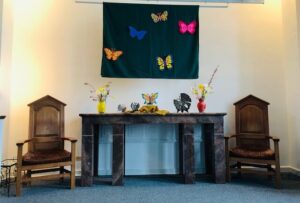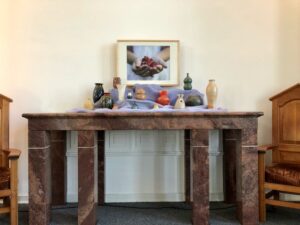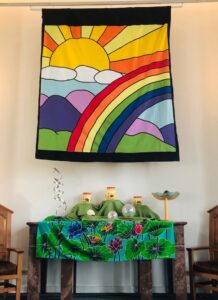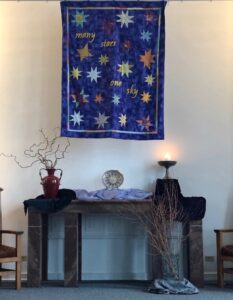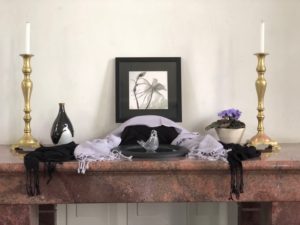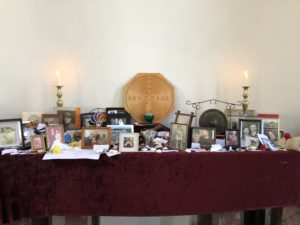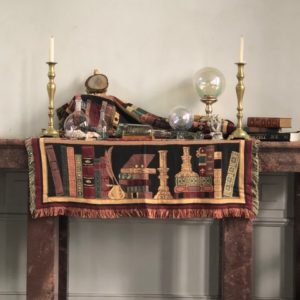We have sung the hymn Morning Has Broken, with its references to the sensation of fresh defall in the wet garden, the sound of blackbird singing, and the sight of sunlight. The hymn writer praises for them, and names their origin in the Word, meaning the sacred text of the Bible, and originating in God’s creativity.
And we have heard Wendy read the poem Wild Geeseby Mary Oliver. The poet names the sound of the wild geese, and names the sun and the clear pebbles of rain moving over the trees and rivers. She names the soft animal of your body….and says you only have to let it love what it loves. She concludes that we find our freedom from loneliness and despair when we remember our place in this family of the natural world.
And we started the service with an opportunity to tell someone else a time you have found beauty in nature. There was an assumption that you had found beauty in nature at some time, and I think that assumption proved true.
So I think we can say that there is something spiritual about nature. Indeed, this is demonstrated every time I hear someone say that going hiking on a Sunday morning is simply finding a different kind of church. This is why we have a memorial garden and a labyrinth garden, so lovingly tended here on our church grounds.
So, I think we can almost all generally begin together with the premise that the sacred is accessed in nature. Nature helps us trust in new beginnings. Nature gives us beauty as a model for our lives. Nature gives solace to our senses.
But let’s look at that more closely. This could be defined with more precision. Theologians can create endless nuances of meaning. This morning I would like to lift up four. At the bottom you will find four terms. I will read them now.
* Naturalistic theism: the belief that “nature includes the divine; God or the divine is but one force or process operating in the natural world.”
*Pantheism: equation of God with nature. “The divine and nature are in some sense identical; nature itself is divine.”
*Panentheism: belief that God is both immanent (active within us) and transcendent (a divine being). “The divine is independent of and transcends nature, but also includes nature.”
*Neopaganism: “an earth-centered and often polytheistic tradition that sees divinity in everything and emphasizes ritual practices and participatory experience.”
—from Building Your Own Theology by Richard Gilbert; he credits Paul Rasor for words in quotes.
I’ll let you sit with that a minute. Perhaps you see one that seems like it fits you.
Do these definitions help us in the real life obstacles that we face? I want to lift up three dilemmas in which can make us think harder about this.
Here is the first dilemma. We humans harm earth. We harm earth by overconsuming certain foods outside our bioregion and by becoming accustomed to specialized foods that are shipped long distances. We harm the earth by continuing to use highly polluting forms of travel for luxury instead of just necessity. We harm the earth by becoming accustomed to disposing of things instead of repairing and reusing. Now, some people have posited that Mother Earth is synonomous with Mother Goddess. If this is true, then can we conclude that in harming the earth that we are harming the divine?
If so, then we might want to change how we are doing things so that we preserve what is sacred. This line of reasoning was used in the 2006 Unitarian Universalist Statement of Conscience on the Threat of Global Warming and Climate Change. This means that UUs from all over the country came together and voted on this statement. Part of it reads: “We as Unitarian Universalists are called to join with others to halt practices that fuel global warming and climate change, to instigate sustainable alternatives, and to mitigate the impending effects of global warming/climate change with just and ethical responses. As a a people of faith, we commite to a renewed reverence for life and respect for the interdependent web of all existence.” That is a noble statement, is it not? Well, I am happy to say that those words were put into practice when the national offices were moved about four years ago. A building was renovated using high environmental building standards. Today, visitors to the headquarters and national staff who work there see the principles in practice.
Now, that is well and good. But let me ask the question again: Can we conclude that in harming the earth that we are harming the divine?
We might challenge that conclusion and say that no, it is not possible for humans to harm the divine. The very definition of what is divine is that it is everlasting and sustaining, and therefore beyond our temporary human actions. So, then, our harmful actions are simply harming to the physical matter of the earth, but not to the spiritual aspects of the earth. If this is true, then we can trust that the divine will always be there, no matter how short-sighted our own consumption. In this way, we can have trust and comfort in something bigger than we are. When the world is falling apart, when we feel horrible for our actions, isn’t is good to believe that there is something beyond harm?
I invite you to reflect again on which theology makes sense to you and what you know in your mind and your bones.
Here is a second dilemma. Sometimes nature harms us.
Here is an example. I recall in 2010 when my meditation teacher had asked me to commit to meditating every day on a tree, and as I meditated I was to feel myself having roots reaching down and nourished by the earth and to feel myself having branches reaching up and nourished by the sun. The point of the meditation was that I myself let myself receive nourishment and to feel sturdy in the world. Well, after about a month of this daily meditation, we had a wind storm in Charlottesville that June. It was called a microburst. At my home, a tree fell across the front porch while we sat and watched the window become obscured. Across town, 100 year old trees toppled. Whole neighborhoods lost their canopy. For the next few weeks, as we resumed normal activity, we were greeted by masses of roots upturned along the road. Tree companies first helped the people whose roofs were destroyed before helping others whose trees were simply down. When I returned to my meditation the next day, I simply could not image a tree as a trusty image of sturdiness. Instead, I felt pretty nauseated. I told this dilemma to my meditation teacher, who lived in California, and he suggested I pick a kind of tree that didn’t fall down. There just wasn’t such a thing. I had found nature unreliable.
And what of people who lived through the flooding in West Virginia two years ago? They could not come to the water communion that year and celebrate the life-giving nature of water, when it had killed their loved ones.
And what of people whose homes have been destroyed by hurricanes—those powerful winds. Can those people hear the song “Spirit of Life”… “Blow in the wind, rise in the sea” and find comfort?
For someone who had equated nature and God, suddenly, they have to question whether God is good. This can cause a crisis of faith. After such a crisis, I hope that a person can stick with it long enough to get past the shock and loss and then to rebuild not only their home but to rebuild a theology. A theology that allows for the reality of the elements that cause birth, life, and death.
I invite you to look again at the definitions and see where you find yourself.
Finally a third dilemma. Let us presume that we want a theology that tells us how to act well in the world. In other words, we want our spirituality to tell us how to act ethically when we find ourselves in difficult situations. Yes? If so, then can we say that nature gives us an ethical framework?
Immediately, one could say, no—we have the example of violence between animals in the nature shows on television. We have the example of the bird called the hen cuckoo, which pushes an egg out of someone else’s nest and then lays their own and flies off. The animal kingdom does not show regular kindness and love.
But, one could argue in return that while that is true, we do see care and tenderness in nature. Animals reproduce. They are motivated to protect their young. Hence we hear phrases such as Mother Bear or mother hen. And as we look at humans, most of the time, human parents also care for their young. But even that is not consistent.
And, don’t we want a theological model that is consistent?
Perhaps, then, one can say that Love and Goodness are a force that comes from something beyond nature. Nature cannot be relied upon to tell us right and wrong and how to show compassion at all times. And so, could there be something transcendent, something that wells up in our conscience and our hearts that shows us how to do good and be loving? And if so, what name would you give to that?
My friends, thank you for coming along with me on this exploration. I hope that you will leave today with a keener sense of how you define your beliefs and how they support you through times of hardship. For me, in my life, at different stages, I have held each one of those beliefs. At this time, I settle on Panentheism. As you go forth into this spring, as you see the world unfolding around you, may you find comfort and love and may you give comfort and love.
Blessed be,
Amen



